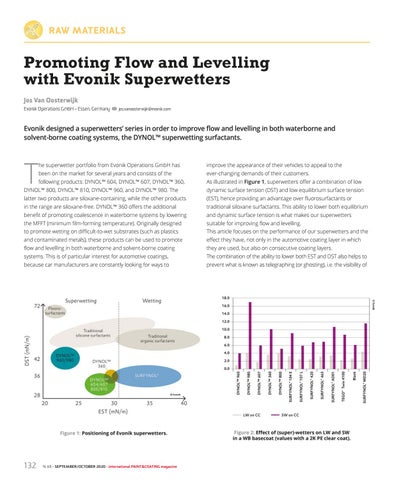RAW MATERIALS
Promoting Flow and Levelling with Evonik Superwetters Jos Van Oosterwijk Evonik Operations GmbH – Essen, Germany
jos.vanoosterwijk@evonik.com
Evonik designed a superwetters’ series in order to improve flow and levelling in both waterborne and solvent-borne coating systems, the DYNOL™ superwetting surfactants.
T
he superwetter portfolio from Evonik Operations GmbH has
improve the appearance of their vehicles to appeal to the
been on the market for several years and consists of the
ever-changing demands of their customers.
following products: DYNOL™ 604, DYNOL™ 607, DYNOL™ 360,
As illustrated in Figure 1, superwetters offer a combination of low
DYNOL™ 800, DYNOL™ 810, DYNOL™ 960, and DYNOL™ 980. The
dynamic surface tension (DST) and low equilibrium surface tension
latter two products are siloxane-containing, while the other products
(EST), hence providing an advantage over fluorosurfactants or
in the range are siloxane-free. DYNOL™ 360 offers the additional
traditional siloxane surfactants. This ability to lower both equilibrium
benefit of promoting coalescence in waterborne systems by lowering
and dynamic surface tension is what makes our superwetters
the MFFT (minimum film-forming temperature). Originally designed
suitable for improving flow and levelling.
to promote wetting on difficult-to-wet substrates (such as plastics
This article focuses on the performance of our superwetters and the
and contaminated metals), these products can be used to promote
effect they have, not only in the automotive coating layer in which
flow and levelling in both waterborne and solvent-borne coating
they are used, but also on consecutive coating layers.
systems. This is of particular interest for automotive coatings,
The combination of the ability to lower both EST and DST also helps to
because car manufacturers are constantly looking for ways to
prevent what is known as telegraphing (or ghosting), i.e. the visibility of
© Evonik
© Evonik
Figure 1: Positioning of Evonik superwetters.
132
N. 65 - SEPTEMBER/OCTOBER 2020 - international PAINT&COATING magazine
Figure 2: Effect of (super)-wetters on LW and SW in a WB basecoat (values with a 2K PE clear coat).
